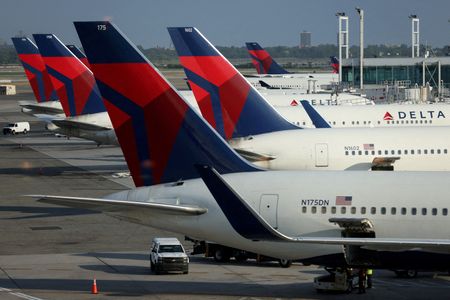By Rajesh Kumar Singh
CHICAGO (Reuters) -Delta Air Lines has a message for investors worried about signs of softening demand on domestic routes: the travel boom is not over yet.
The Atlanta-based carrier on Thursday said it continues to see strength in bookings across its global network as travel remains a “top purchase priority” for customers. As a result, its revenue outlook since the summer has improved, the company said.
The airline, however, is feeling a pinch from labor strikes in the entertainment and automotive industries.
Delta’s comments come against a backdrop of softening domestic demand, leading to worries that consumers are cutting back on travel spending due to a depletion of household savings, the resumption of student loan repayments and high interest rates.
Delta CEO Ed Bastian cautioned against interpreting that as a broader industry trend. “Our consumer is in a very healthy condition,” he said in an interview.
Delta said domestic travel demand is “steady” and initial bookings for the peak holiday periods are strong. Meanwhile, the demand for overseas trips has stayed strong through the autumn season.
In addition, the airline said it has seen a pickup in business travel since the Labor Day holiday early last month.
Delta, which has positioned itself as a premium airline, said demand for high-margin luxurious seats continued to outpace that for low-fare basic economy seats, which now make up less than 5% of its total.
The airline’s upbeat commentary stands in sharp contrast to some of the domestic low-fare carriers, which have been flagging slowing demand.
Ultra-low-cost carrier Spirit Airlines last month cut its profit outlook for the third quarter, citing “heightened promotional activity with steep discounting.” Frontier Airlines said it was facing pressure to offer “very, very low” fares to fill its planes.
Bastian acknowledged some discounting pressure at the lower end of the price category, but doesn’t see that as a “material risk” for Delta.
“Our consumer is a very different consumer than that would be purchasing the lower fare categories,” he said.
A jump in fuel prices since July is pressuring profits, inflating the company’s costs by $400 million in the second half of the year. Delta now expects adjusted earnings of $6 to $6.25 per share this year, compared with the $6 to $7 per share forecast issued in July.
For the fourth quarter, the airline expects adjusted earnings of $1.05 to $1.30 per share. That puts the midpoint higher than the $1.09 estimated by Wall Street analysts.
Adjusted profit for the third quarter came in at $2.03 per share, topping analysts expectations by 8 cents, according to LSEG data.
“The carrier … certainly does not strike us as an entity whose fundamentals are being hit by any demand slowdown,” said Citi Research analyst Stephen Trent.
(Reporting by Rajesh Kumar Singh and Mehr Bedi; Editing by Arun Koyyur, Nick Zieminski and Bill Berkrot)

